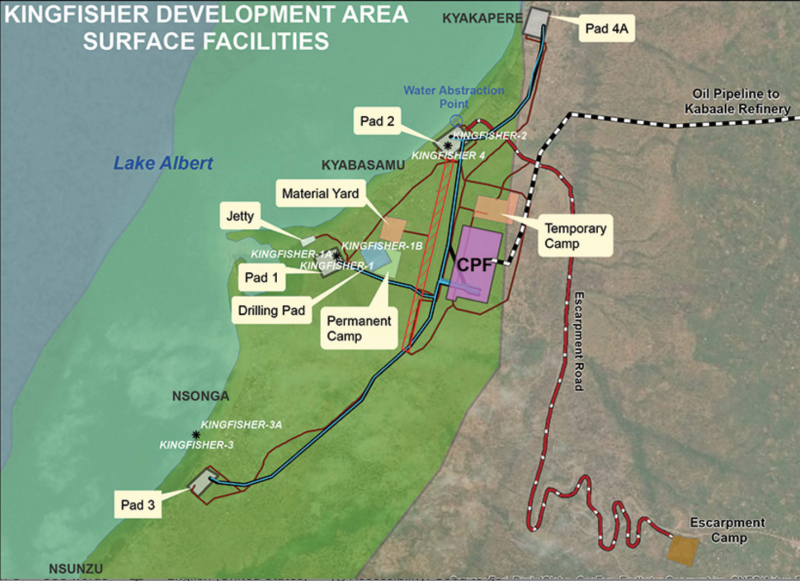The Petroleum Authority of Uganda (PAU) is hoping to model the experience of countries such as Norway and the UAE to leverage its oil and gas riches to maintain gains in economic growth and diversification beyond the life cycle of those projects.
Uganda expects a long-term economic uplift over the next 3 decades as oil and gas revenues pour $8.6 billion into Uganda’s GDP as production from the Kingfisher and Tilenga upstream parts of the Lake Albert development comes on-stream in 2025 (Fig. 1).

Related investments more than double this amount with $4 billion earmarked to build the Kabaale refinery in Hoima district near Lake Albert; $5 billion to construct the East African Crude Oil Pipeline (EACOP) to export crude from Kabaale to the port of Tanga in Tanzania; and construction of Uganda’s second international airport at Kabaale, the Kabaale Industrial Park, and a related network of 12 tarmac roads.
Added up, the greatest challenge then becomes how to direct oil and gas profits into building a strong and diverse economy that benefits all Ugandans over the long term by financing capital investments, developing human capital, creating private-sector jobs, and building and maintaining infrastructure development.
That was the view expressed by Pamela K. Mbabazi, executive chair of Uganda’s National Planning Authority, who presented her vision of the future at the 1st Sectoral Linkages Conference organized by the PAU in Kampala on 11–12 April.
Uganda Plans in Ernest To Avoid “The Oil Curse”
Mbabazi underlined that ministries, departments, and agencies must collaborate while conducting research needed to craft a holistic approach to economic development that would link all sectors into Uganda's 4th National Development Plan.
Irene Bateebe, permanent secretary of Uganda’s Energy and Mineral Development Ministry, pointed to the UAE and Norway as models for how oil and gas profits can be leveraged to develop diversified national economies that are sustainable.
“Uganda has all the ingredients to succeed,” said Gunnar Sjøgren, project director international cooperation for the Norwegian Offshore Directorate, who also spoke at the conference and echoed Bateebe’s comments regarding the relevance to Uganda of the Norwegian and UAE experiences.
PAU’s Director of Legal and Corporate Affairs Ali Ssekatawa said, “We have a team of scientists, economists, and so on who are tasked with finding local solutions to risks such as the ‘Dutch disease’ and ‘oil curse.’”
Dutch disease and oil curse refer to the economic phenomenon that typically occurs when a country experiences a sudden influx of revenue from natural resources, such as oil and gas. This revenue often leads to currency appreciation, which can have adverse effects on other sectors of the economy, particularly manufacturing and agriculture.
The term Dutch disease originated in the Netherlands in the 1960s when the discovery of natural gas reserves led to a significant increase in revenue. The subsequent appreciation of the Dutch guilder made nonresource exports less competitive on the global market, resulting in a decline in manufacturing and other industries.
“The first baby steps include bringing together industry captains for a conversation, and benchmarking with countries such as Ghana, Nigeria, Canada, and Norway, which have been producing oil,” Ssekatawa added. “This benchmarking revealed that we can benefit from backward and forward linkages such as education, health, agriculture, and land use planning, among others.”
Linkages that spin off directly from oil and gas-related activities include production of liquid petroleum gas and other petroleum products for domestic consumption and fertilizer production from refinery byproducts. Valerie Marcel, executive director and founder of New Producers for Sustainable Energy, provided insights into global precedents, citing examples from Ghana, Guyana, and Ecuador.
For Further Reading
Uganda Drilling Operations Progress for Tilenga, Kingfisher Projects, JPT.
Total Energies Spuds First of Hundreds of Wells in Uganda Megaproject by Trent Jacobs, JPT.
Tanzania Greenlights World’s Longest Heated Crude Pipeline by Pat Davis Szymczak, JPT.


